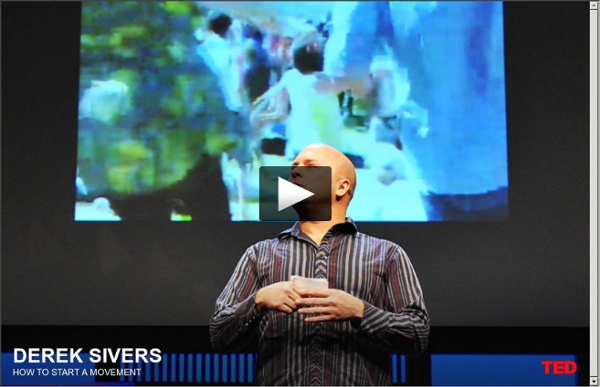



http://www.ted.com/talks/derek_sivers_how_to_start_a_movement.html
Related: patriquel • ZeitheistTeaching English to Second Language Learners by fi2 (Miscellaneous) - ProZ.com translation articles Teaching english to second-language learners Many translators and other well-versed in English people around the world engage in a form of language-related labour: teaching English to second language learners. This activity can be both rewarding and pleasurable and off-course produce income. Those who engage in this activity do it either with professionals willing to learn English for work or with students of various grades needing improvement in this subject. Eco-city Inside a One Kilometer Crater in Siberia Eco-city 2020 is a proposal for the rehabilitation of the Mirniy industrial zone in Eastern Siberia, Russia designed by the innovative architectural studio AB Elis Ltd. The project would be located inside a giant man-made crater of more than one kilometer in diameter and 550 meters deep that used to be one of the world’s largest quarries. The idea is to create a new garden city that will be shielded from the harsh Siberian environmental conditions characterized by long and severe winters and short hot summers. The new city would attract tourists and residents to Eastern Siberia and would be able to accommodate more than 100,000 people.
Is There A Peak Age for Entrepreneurship? Editor’s note: Adeo Ressi, is the founder of The Founder Institute and TheFunded.com In this guest post he argues against ageism when it comes to to entrepreneurs. Ressi is 39. The recent articles proclaiming that 25 is the peak age for entrepreneurship deserve a considered and factual response. The demographic and racial profiling that has plagued venture capital and tech entrepreneurship has a new friend—ageism. This has to stop. Anecdotal Evidence:
The Bedford Research Room: Evaluating the Relevance of a Scholarly or Professional Journal Article How to Evaluate Sources The authors of articles in scholarly or professional journals use one of two main strategies to help readers determine whether their article is relevant to readers needs and interests. An abstract—a brief description of the article and its results—often appears at the beginning of the article. When an abstract is not used, an article's introduction often provides similar information. Praising slowness - Carl Honore Brainstorm examples of what Honoré calls “bad slow” and “good slow.” Create an entertaining way to share your examples with others, and work with classmates to launch a “Slow Living” exhibit or fair in your community—perhaps in conjunction with the Global Day of Slow Living (exact dates vary year to year, but it usually falls during spring). Honoré says, “Some of the most heartrending emails that I get on my website are actually from adolescents hovering on the edge of burnout, pleading with me to write to their parents, to help them slow down, to help them get off this full-throttle treadmill.” Inspired by these pleas and growing out of his own experiences as a parent, three years after his TED talk Honoré authored "Under Pressure: Rescuing Our Children From The Culture Of Hyper-Parenting." Learn more about the genesis of this book and why Honoré worries about kids today at
Visual Literacy Activities with Online Resources Last week I talked about visual literacy in Visual Literacy Activities with Children's Picture Books. I suggested children's picture books make a natural place to start teaching kids about visual literacy. Here are some online resources I've found that also support visual literacy. 19-Year-Old Develops Cleanup Array To Remove 7,250,000 Tons Of Plastic From Oceans Another young creative mind working towards bettering our world. 19-year-old Boyan Slat has revealed his plans to the world regarding his Ocean Cleanup Array that could remove 7,250,000 tons of plastic waste from the world’s oceans. The revolutionary device consists of an anchored network of floating booms and processing platforms that could be dispatched to garbage patches around the world. Instead of moving through the ocean, the array would span the radius of a garbage patch, acting as a giant funnel.
How Many Hours Should a Startup Employee Work? Every so often I get drawn into the debate about startup employees and how much they should work. Should you hire workaholics? Is it expected that startup employees work 100+ hours per week? Strategies Cooperative learning involves having students work together to maximize their own and one another’s learning (Johnson, Johnson & Smith, 1991). This page provides resources about cooperative learning, designing effective small group activities, and guidance for creating and sustaining effective student learning groups in engineering and lab courses. CRLT Occasional Paper on Using Teams This summary of the research covers topics such as desinging effective team assignments, forming teams, and assessing student teams. The paper includes numerous examples from U-M faculty. While it is focused on STEM classrooms, the practical advice it contains is relevant to any instructor considering the use of groups or teams {*style:<a href=' Bibliography on Cooperative Learning, Group Work, and Teamwork{*style:</a>*}{*style:<br>*} A comprehensive list of resources on the effectiveness of cooperative learning, group work, teamwork, and best practices.
Wanting Meaningful Work Is Not a First World Problem - Umair Haque “I read your latest essay.” Arms crossed, eyes ablaze. “I don’t think you get it. At. Get anyone to like you Get anyone to like you - Instantly - Guaranteed If you want people to like you, make them feel good about themselves. This golden rule of friendship works every time - guaranteed! The principle is straightforward. If I meet you and make you feel good about yourself, you will like me and seek every opportunity to see me again to reconstitute the same good feeling you felt the first time we met. Unfortunately, this powerful technique is seldom used because we are continually focused on ourselves and not others.